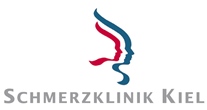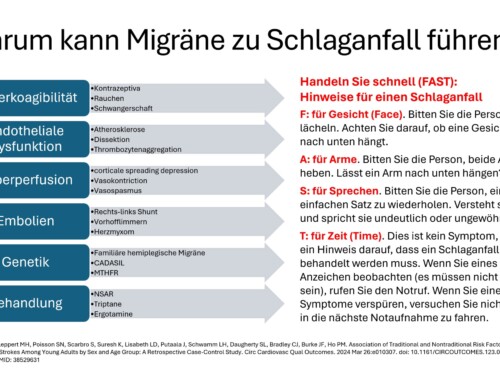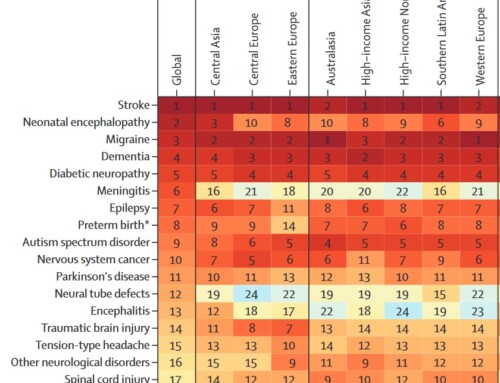Kiel, Helsinki, Oslo, Cambridge (MA), June 20, 2016. In the world's largest migraine study to date, 44 new gene variants were discovered. They are associated with an increased risk of developing migraines. Many of these gene variants are located in the areas of the genome that regulate the brain's circulatory system. The new discoveries indicate that a disruption in the blood supply to the brain is essential for the development of migraines. The results are published today in the scientific journal “Nature Genetics”. They are a milestone in understanding the causes of migraines.
The project was carried out over several years by scientists from the international headache genetics consortium with the participation of researchers from the Kiel Pain Clinic in cooperation with Prof. Christian Kubisch, Institute for Human Genetics at the University of Hamburg. Also involved from Kiel is Prof. Stefan Schreiber, from the University's Institute for Clinical Molecular Biology. Research teams from Australia, Denmark, Estonia, Finland, Germany, Iceland, the Netherlands, Norway, Spain, Sweden, the UK and the USA took part in the project. The study is based on genetic samples from 375,000 Europeans, Americans and Australians.
The causes of migraines have been the subject of intensive scientific research worldwide for decades. The new study discovered genetic variants for the first time that suggest a special reaction of the brain's circulatory system as the main cause of the development of migraines.
Prof. Hartmut Göbel (58), director of the Kiel Pain Clinic and co-author, said: “The data from our study prove for the first time that the reaction of the arteries and the smooth muscles in the vessel walls of the circulatory system is essential for the development of migraines. The arteries supply the nerve cells of the brain with oxygen and energy. These are important for the regulated nerve function. According to the new data, a temporary disruption in care due to the special genetic makeup of those affected during the migraine attack plays a decisive role in the triggering of migraine attacks.
According to the World Health Organization, migraine is the sixth most severely disabling human disease. Headache disorders overall rank third among the most severely disabling diseases worldwide. Around a million people in Germany alone suffer from migraine attacks every day. Of these, 100,000 are bedridden every day. Over a billion people are affected worldwide.
Migraines cause very severe pulsating, throbbing headaches. Physical activity increases pain, leaving patients confined to bed. They cannot participate in social and professional life. The attacks can be accompanied by severe nausea and insatiable vomiting. Light, noise and general excessive sensory sensitivity make the attacks even more difficult. In over 10% of those affected, the attacks can be initiated by neurological deficits such as severe visual impairments, paralysis, speech disorders or impaired consciousness. Serious complications of migraine include stroke, epileptic seizures and psychological comorbidities. In Germany alone, an average of 8.3 million people take headache medication every day to treat severe headaches.
Epidemiological studies in recent years have confirmed that migraine is associated with an increased risk of stroke, heart attack and other diseases of the cardiovascular system.
The new data on migraine development are consistent with these findings. For the first time, the current study revealed that a variant of the PHACTR1 gene is associated with an increased risk of migraines. The same gene variant causes an increased risk of a tear in the artery wall in the neck area. This is called cervical arterial dissection and is an important cause of stroke in young patients.
The 44 gene variants now identified are located on 38 genes. The study has for the first time uncovered 28 previously completely unknown gene variants that play an essential role in the development of migraines. In addition, other previously known gene variants were confirmed.
To uncover these new gene variants, the researchers combined data from over 22 genome-wide association studies. They included data from around 35,000 migraine patients. Of the several million genetic variants that were analyzed, 38 independent genomic regions were discovered that are associated with an increased risk of migraines. Only 10 of these regions were previously known.
Since the individual gene variants only slightly increase the risk of migraines, the new results could only be achieved by researchers worldwide pooling their samples and analyses. For this reason, international collaboration is crucial to uncovering the complex neurological features that underlie the development of migraine.
The new genetic findings and analyzes now enable the first concrete steps towards the development of an individually personalized treatment for the complex widespread disease migraine. Already today, over 30 different types of migraine are clinically differentiated. Migraine patients respond very differently to different therapy methods. Medications that are very effective for some of those affected may be ineffective for others. The newly discovered findings can be the basis for dividing those affected into different genetic risk groups. Using selective therapeutic approaches, the best possible therapeutic methods can then be developed for the respective subgroup with a specific genetic pattern. This can lead to significantly more effective and tolerable prevention and acute treatment of migraine attacks.
Original publication:
Meta-analysis of 375,000 individuals identifies 38 susceptibility loci for migraine (2016). Padhraig Gormley, Verneri Anttila, Bendik S Winsvold et al. Nature Genetics
http://www.nature.com/ng/journal/vaop/ncurrent/full/ng.3598.html
More information:
Prof. Hartmut Göbel
Tel: 0431-20099150
e-mail: hg@krebsklinik.de
Press Release University of Helsinki: Large-scale genetic study provides new insight into the causes of migraine
Radio Podcast Prof. Hartmut Göbel, Kiel Pain Clinic: Genetic basis of migraine: Importance of the new study for research and treatment
Radio Podcast Prof. Dale Nyholt, Queensland University of Technology: World's largest ever migraine study identifies genetic regions linked to their onset
Participating centers
Padhraig Gormley* ,1,2,3,4 , Verneri Anttila* ,2,3,5 , Bendik S Winsvold 6,7,8 , Priit Palta 9 , Tonu Esko 2,10,11 , Tune H. Pers 2,11 ,12,13 , Kai-How Farh 2,5,14 , Ester Cuenca-Leon 1,2,3,15 , Mikko Muona 9,16,17,18 , Nicholas A Furlotte 19 , Tobias Kurth 20,21 , Andres Ingason 22 , George McMahon 23 , Lannie Ligthart 24 , Gisela M Terwindt 25 , Mikko Kallela 26 Tobias M Freilinger 27,28 , Caroline Ran 29 , Scott G Gordon 30 , Anine H Stam 25 , Stacy Steinberg 22 , Guntram Borck 31 , Markku Koiranen 32 , Lydia Quaye 33 , Hieab HH Adams 34.35 , Terho Lehtimäki 36 , Antti-Pekka Sarin 9 , Juho Wedenoja 37 , David A Hinds 19 , Julie E Buring 21.38 , Markus Schürks 39 , Paul M Ridker 21.38 , Maria Gudlaug Hrafnsdottir 40 , Hreinn Stefansson 22 , Susan M Ring 23 , Jouke-Jan Hottenga 24 Brenda WJH Penninx 41 , Markus Färkkilä 26 , Ville Artto 26 , Mari Kaunisto 9 , Salli Vepsäläinen 26 , Rainer Malik 27 , Andrew C Heath 42 , Pamela AF Madden 42 , Nicholas G Martin 30 , Grant W Montgomery 30 , Mitja Kurki 1,2,3 , Mart Kals 10 , Reedik Mägi 10 , Kalle Pärn 10 , Eija Hämäläinen 9 , Hailiang Huang 2,3,5 , Andrea E Byrnes 2,3,5 , Lude Franke 43 , Jie Huang 4 , Evie Stergiakouli 23 , Phil H Lee 1,2,3 , Cynthia Sandor 44 , Caleb Webber 44 , Zameel Cader 45,46 , Bertram Muller-Myhsok 47 , Stefan Schreiber 48 , Thomas Meitinger 49 , Johan G Eriksson 50.51 , Veikko Salomaa 51 , Kauko Heikkilä 52 , Elizabeth Loehrer 34.53 , Andre G Uitterlinden 54 Albert Hofman 34 , Cornelia M van Duijn 34 , Lynn Cherkas 33 , Linda M. Pedersen 6 , Audun Stubhaug 55.56 , Christopher S Nielsen 55.57 , Minna Männikkö 32 , Evelin Mihailov 10 , Lili Milani 10 , Hartmut Göbel 58 , Ann-Louise Esserlind 59 , Anne Francke Christensen 59 , Thomas Folkmann Hansen 60 , Thomas Werge 61, 62.63 , International Headache Genetics Consortium 64 , Jaakko Kaprio 9,65,66 , Arpo J Aromaa 51 , Olli Raitakari 67.68 , M Arfan Ikram 34,35,68 , Tim Spector 33 , Marjo-Riitta Järvelin 32.70, 71.72 , Andres Metspalu 10 , Christian Kubisch 73 , David P Strachan 74 , Michel D Ferrari 25 , Andrea C Belin 29 , Martin Dichgans 27.75 , Maija Wessman 9.16 , Arn MJM van den Maagdenberg 25.76 , John- Anker Zwart 6,7,8 , Dorret I Boomsma 24 , George Davey Smith 23 , Kari Stefansson 22,77 , Nicholas Eriksson 19 , Mark J Daly 2,3,5 , Benjamin M Neale §,2,3,5 , Jes Olesen §,59 , Daniel I Chasman §,21,38 , Dale R Nyholt §,78 , and Aarno Palotie §,1,2,3,4,5,9,79 .
1 Psychiatric and Neurodevelopmental Genetics Unit, Massachusetts General Hospital and Harvard Medical School, Boston, USA. 2 Medical and Population Genetics Program, Broad Institute of MIT and Harvard, Cambridge, USA. 3 Stanley Center for Psychiatric Research, Broad Institute of MIT and Harvard, Cambridge, USA. 4 Wellcome Trust Sanger Institute, Wellcome Trust Genome Campus, Hinxton, UK. 5 Analytic and Translational Genetics Unit, Massachusetts General Hospital and Harvard Medical School, Boston, USA. 6 FORMI, Oslo University Hospital, PO 4956 Nydalen, 0424 Oslo, Norway. 7 Department of Neurology, Oslo University Hospital, PO 4956 Nydalen, 0424 Oslo, Norway. 8 Institute of Clinical Medicine, University of Oslo, PO 1171 Blindern, 0318 Oslo, Norway. 9 Institute for Molecular Medicine Finland (FIMM), University of Helsinki, Helsinki, Finland. 10 Estonian Genome Center, University of Tartu, Tartu, Estonia. 11 Division of Endocrinology, Boston Children's Hospital, Boston, USA. 12 Statens Serum Institut, Dept of Epidemiology Research, Copenhagen, Denmark. 13 Novo Nordisk Foundation Center for Basic Metabolic Research, University of Copenhagen, Copenhagen, Denmark. 14 Illumina, 5200 Illumina Way, San Diego, USA. 15 Vall d'Hebron Research Institute, Pediatric Neurology, Barcelona, Spain. 16 Folkhälsan Institute of Genetics, Helsinki, Finland, FI-00290. 17 Neuroscience Center, University of Helsinki, Helsinki, Finland, FI-00014. 18 Research Programs Unit, Molecular Neurology, University of Helsinki, Helsinki, Finland, FI-00014. 19 23andMe, Inc., 899 W. Evelyn Avenue, Mountain View, CA, USA. 20 Inserm Research Center for Epidemiology and Biostatistics (U897), University of Bordeaux, 33076 Bordeaux, France. 21 Division of Preventive Medicine, Brigham and Women's Hospital, Boston MA 02215. 22 deCODE Genetics, 101 Reykjavik, Iceland. 23 Medical Research Council (MRC) Integrative Epidemiology Unit, University of Bristol, Bristol, UK. 24 VU University Amsterdam, Department of Biological Psychology, Amsterdam, the Netherlands, 1081 BT. 25 Leiden University Medical Center, Department of Neurology, Leiden, The Netherlands, PO Box 9600, 2300 RC. 26 Department of Neurology, Helsinki University Central Hospital, Haartmaninkatu 4, 00290 Helsinki, Finland. 27 Institute for Stroke and Dementia Research, Hospital of the University of Munich, Ludwig-Maximilians-University Munich, Feodor-Lynen-Str. 17, 81377 Munich Germany. 28 Department of Neurology and Epileptology, Hertie Institute for Clinical Brain Research, University of Tuebingen. 29 Karolinska Institutet, Department of Neuroscience, 171 77 Stockholm, Sweden. 30 Department of Genetics and Computational Biology, QIMR Berghofer Medical Research Institute, 300 Herston Road, Brisbane, QLD 4006, Australia. 31 Ulm University, Institute of Human Genetics, 89081 Ulm, Germany. 32 University of Oulu, Center for Life Course Epidemiology and Systems Medicine, Oulu, Finland, Box 5000, Fin-90014 University of Oulu. 33 Department of Twin Research and Genetic Epidemiology, King's College London, London, UK. 34 Dept of Epidemiology, Erasmus University Medical Center, Rotterdam, the Netherlands, 3015 CN. 35 Dept of Radiology, Erasmus University Medical Center, Rotterdam, the Netherlands, 3015 CN. 36 Department of Clinical Chemistry, Fimlab Laboratories, and School of Medicine, University of Tampere, Tampere, Finland, 33520. 37 Department of Public Health, University of Helsinki, Helsinki, Finland. 38 Harvard Medical School, Boston MA 02115. 39 University Duisburg Essen, Essen, Germany. 40 Landspitali University Hospital, 101 Reykjavik, Iceland. 41 VU University Medical Center, Department of Psychiatry, Amsterdam, the Netherlands, 1081 HL. 42 Department of Psychiatry, Washington University School of Medicine, 660 South Euclid, CB 8134, St. Louis, MO 63110, USA. 43 University Medical Center Groningen, University of Groningen, Groningen, The Netherlands, 9700RB. 44 MRC Functional Genomics Unit, Department of Physiology, Anatomy & Genetics, Oxford University, UK. 45 Nuffield Department of Clinical Neuroscience, University of Oxford, UK. 46 Oxford Headache Centre, John Radcliffe Hospital, Oxford, UK. 47 Max Planck Institute of Psychiatry, Munich, Germany. 48 Christian Albrechts University, Kiel, Germany. 49 Institute of Human Genetics, Helmholtz Center Munich, Neuherberg, Germany. 50 Department of General Practice and Primary Health Care, University of Helsinki and Helsinki University Hospital, Helsinki Finland. 51 National Institute for Health and Welfare, Helsinki, Finland. 52 Institute of Clinical Medicine, University of Helsinki, Helsinki, Finland. 53 Department of Environmental Health, Harvard TH Chan School of Public Health, Boston, USA 02115. 54 Dept of Internal Medicine, Erasmus University Medical Center, Rotterdam, the Netherlands, 3015 CN. 55 Dept of Pain Management and Research, Oslo University Hospital, Oslo, 0424 Oslo, Norway. 56 Medical Faculty, University of Oslo, Oslo, 0318 Oslo, Norway. 57 Division of Mental Health, Norwegian Institute of Public Health, PO Box 4404 Nydalen, Oslo, Norway, NO-0403. 58 Kiel Pain and Headache Center, 24149 Kiel, Germany. 59 Danish Headache Center, Department of Neurology, Rigshospitalet, Glostrup Hospital, University of Copenhagen, Denmark. 60 Institute of Biological Psychiatry, Mental Health Center Sct. Hans, University of Copenhagen, Roskilde, Denmark. 61 Institute Of Biological Psychiatry, MHC Sct. Hans, Mental Health Services Copenhagen, DK-2100 Copenhagen, Denmark. 62 Institute of Clinical Sciences, Faculty of Medicine and Health Sciences, University of Copenhagen, DK-2100 Copenhagen, Denmark. 63 iPSYCH – The Lundbeck Foundation's Initiative for Integrative Psychiatric Research, DK-2100 Copenhagen, Denmark. 64 A list of members and affiliations appears in the Supplementary Note. 65 Department of Public Health, University of Helsinki, Helsinki, Finland. 66 Department of Health, National Institute for Health and Welfare, Helsinki, Finland. 67 Research Center of Applied and Preventive Cardiovascular Medicine, University of Turku, Turku, Finland, 20521. 68 Department of Clinical Physiology and Nuclear Medicine, Turku University Hospital, Turku, Finland, 20521. 69 Dept of Neurology, Erasmus University Medical Center, Rotterdam , the Netherlands, 3015 CN. 70 Imperial College London, Department of Epidemiology and Biostatistics, MRC Health Protection Agency (HPE) Center for Environment and Health, School of Public Health, UK, W2 1PG. 71 University of Oulu, Biocenter Oulu, Finland, Box 5000, Fin-90014 University of Oulu. 72 Oulu University Hospital, Unit of Primary Care, Oulu, Finland, Box 10, Fin-90029 OYS. 73 University Medical Center Hamburg Eppendorf, Institute of Human Genetics, 20246 Hamburg, Germany. 74 Population Health Research Institute, St George's, University of London, Cranmer Terrace, London SW17 0RE, UK. 75 Munich Cluster for Systems Neurology (SyNergy), Munich, Germany. 76 Leiden University Medical Center, Department of Human Genetics, Leiden, The Netherlands, PO Box 9600, 2300 RC. 77 Faculty of Medicine, University of Iceland, 101 Reykjavik, Iceland. 78 Statistical and Genomic Epidemiology Laboratory, Institute of Health and Biomedical Innovation, Queensland University of Technology, 60 Musk Ave, Kelvin Grove, QLD 4059, Australia. 79 Department of Neurology, Massachusetts General Hospital, Boston, USA.










Leave a comment